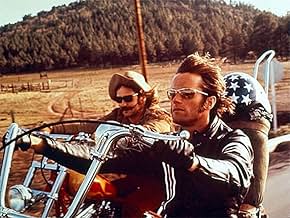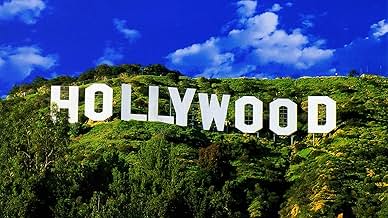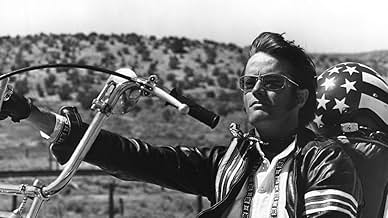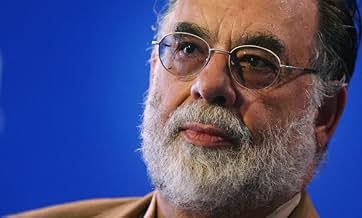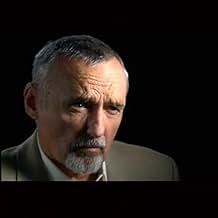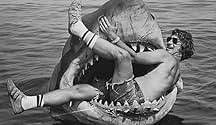Easy Riders, Raging Bulls: How the Sex, Drugs and Rock 'N' Roll Generation Saved Hollywood
IMDb RATING
7.5/10
3.2K
YOUR RATING
A look at 1970s Hollywood when it was known as New Hollywood, and the director was the star of the movie.A look at 1970s Hollywood when it was known as New Hollywood, and the director was the star of the movie.A look at 1970s Hollywood when it was known as New Hollywood, and the director was the star of the movie.
- Director
- Writers
- Stars
Sam Peckinpah
- Self
- (archive footage)
- Director
- Writers
- All cast & crew
- Production, box office & more at IMDbPro
Featured reviews
The last golden age of Hollywood film-making is captured in this two hour documentary, based on Peter Biskind's bestselling book of the same name. Director Kenneth Bowser does a commendable job of corralling many of the key names of the period in this light but passable introduction to the topic.
Bowser's treatise of 1970s Hollywood is essentially a potted history of the time many of the key developments and vital films that were made during this period are passed over or given nothing more than a cursory glance. The documentary suffers as a result and added to this, historical inaccuracies are also evident.
Film fans will most enjoy the scenes of archival footage a desperately nerdy George Lucas being introduced as Francis Ford Coppola's 'assistant'; Jack Nicholson, Bob Rafelson, Dennis Hopper and Peter Tork on the set of The Monkees vehicle 'Head'; and the piece de resistance, a home movie with Messrs Spielberg, Lucas, Milius, Coppola, de Palma, Schrader and Scorsese all in the same room. To be a fly on the wall at that party!
There are also current interviews with the likes of Peter Bogdanovich, Dennis Hopper, Peter Bart, John Milius, Michael Phillips, Paul Schrader, Peter Fonda, Albert S. Ruddy and many more figures of the time.
Bowser's documentary serves as a snapshot of the time Biskind's novel is a veritable diary. The book is packed with amazing stories that even a 13-part series couldn't document. Watch this documentary, get a taste of the time and then buy the book to immerse yourself in a fantastic period of American filmic creativity.
Bowser's treatise of 1970s Hollywood is essentially a potted history of the time many of the key developments and vital films that were made during this period are passed over or given nothing more than a cursory glance. The documentary suffers as a result and added to this, historical inaccuracies are also evident.
Film fans will most enjoy the scenes of archival footage a desperately nerdy George Lucas being introduced as Francis Ford Coppola's 'assistant'; Jack Nicholson, Bob Rafelson, Dennis Hopper and Peter Tork on the set of The Monkees vehicle 'Head'; and the piece de resistance, a home movie with Messrs Spielberg, Lucas, Milius, Coppola, de Palma, Schrader and Scorsese all in the same room. To be a fly on the wall at that party!
There are also current interviews with the likes of Peter Bogdanovich, Dennis Hopper, Peter Bart, John Milius, Michael Phillips, Paul Schrader, Peter Fonda, Albert S. Ruddy and many more figures of the time.
Bowser's documentary serves as a snapshot of the time Biskind's novel is a veritable diary. The book is packed with amazing stories that even a 13-part series couldn't document. Watch this documentary, get a taste of the time and then buy the book to immerse yourself in a fantastic period of American filmic creativity.
This docu makes the misguided error of comparing the careers of Hal Ashby and Steven Spielberg. More different film-makers there have never been. However, by sheer virtue of sharing artistic or commercial success in Hollywood in the same decade, these two anomylous inclusions are lumped in together. Peter Bogdanovich regales us simpletons with his self-encyclopedia, as if he were ever more than a journey-man director. It's intriguing to see the commercial success of The Exorcist and the critical success of Mean Streets sharing the same five minute discussion with various Hollywood talking heads all of whom are past their prime.
One of the rare gems of the film is the sequence recalling how Martin Scorcese, Paul Schrader, George Lucas, Spielberg and many other prominent male film-makers would hang out in the same beach houses in Malibu, but it's only ten minutes long. This is a film obsessed with the tangential perks of that divine spark that was the 70's renaissance of American movies. Presumably this film is based on a best-selling book of the same name, but all this film can sum up is that a bunch of cool movies came out in the 70's, and that, YES, the men who made those movies hung out from time to time. Honestly, you'd be better off just watching every film by the directors that this film interviews and save yourself the thankless task of listening to too many Hollywood has-beens pine for yesteryear. What really happened to these people's careers? Drugs for some, ego for others. Spotty at best, this film just isn't all it could be. 3/10
One of the rare gems of the film is the sequence recalling how Martin Scorcese, Paul Schrader, George Lucas, Spielberg and many other prominent male film-makers would hang out in the same beach houses in Malibu, but it's only ten minutes long. This is a film obsessed with the tangential perks of that divine spark that was the 70's renaissance of American movies. Presumably this film is based on a best-selling book of the same name, but all this film can sum up is that a bunch of cool movies came out in the 70's, and that, YES, the men who made those movies hung out from time to time. Honestly, you'd be better off just watching every film by the directors that this film interviews and save yourself the thankless task of listening to too many Hollywood has-beens pine for yesteryear. What really happened to these people's careers? Drugs for some, ego for others. Spotty at best, this film just isn't all it could be. 3/10
Don't think the point of the book/movie was that the people mentioned have disappeared off the face of the earth -- just that they have never achieved the critical AND commerical heights they achieved in the '70's. Spielberg and Lucas have survived and flourished, but they never had any intentions of CHANGING Hollywood, their films basically fit within an established Hollywood tradition. They were squares, in other words.
I ran across the documentary by accident, and am really glad that I did - having been a slave to film study for the last 17 years of my life, I have read about, viewed documentaries involving, and seen the films of most of the filmmakers profiled in Easy Riders, Raging Bulls so I figured it would make for good background noise while I tended to some writing. What surprised me was that I had to postpone my work because I was literally riveted with this film.
Easy Riders, Raging Bulls chronicles the new wave of filmmakers who revolutionized Hollywood in the late 60's and 70's. While a lot of the stories are relatively well known (the foreign film influence, the problems with the filming of Jaws, the raising of the bar in terms of the box office gross) the candid commentary from the directors, producers, writers and actors that were involved was extremely enlightening and brutally honest. One story that sticks in my mind in particular is the telling by various people of the "Malibu Beach Group" that included Scorsese, Keitel, Spielberg and Paul Schrader among others gathering to party and discuss and debate film. Being a complete film geek, when friends and I get into philosophical discussions about where we would go if we could travel back in time to any moment, my answer has always been to be a production assistant on the set of Citizen Kane. After hearing this story in the documentary, transporting myself back to that scene is a close second. Supplementing these interviews were excellent behind-the-scenes footage that I had never seen of the filmmakers at work, which was absolutely fascinating.
While the documentary skips around according to genre, and not necessarily profiling a single filmmaker at a time, the range of directors presented is admirably wide. The obligatory (and famous) Coppola, Scorsese, Bogdanovch, Lucas and Spielberg are profiled with equal air time as directors who are not household names, like Sam Peckinpah, Arthur Penn and Hal Ashby. This is definitely a great documentary to catch if you want to get some ideas for films that you should watch but don't know are out there, as well as see some of the diverse portfolios the more "commercial" directors have in their pasts.
--Shelly
Easy Riders, Raging Bulls chronicles the new wave of filmmakers who revolutionized Hollywood in the late 60's and 70's. While a lot of the stories are relatively well known (the foreign film influence, the problems with the filming of Jaws, the raising of the bar in terms of the box office gross) the candid commentary from the directors, producers, writers and actors that were involved was extremely enlightening and brutally honest. One story that sticks in my mind in particular is the telling by various people of the "Malibu Beach Group" that included Scorsese, Keitel, Spielberg and Paul Schrader among others gathering to party and discuss and debate film. Being a complete film geek, when friends and I get into philosophical discussions about where we would go if we could travel back in time to any moment, my answer has always been to be a production assistant on the set of Citizen Kane. After hearing this story in the documentary, transporting myself back to that scene is a close second. Supplementing these interviews were excellent behind-the-scenes footage that I had never seen of the filmmakers at work, which was absolutely fascinating.
While the documentary skips around according to genre, and not necessarily profiling a single filmmaker at a time, the range of directors presented is admirably wide. The obligatory (and famous) Coppola, Scorsese, Bogdanovch, Lucas and Spielberg are profiled with equal air time as directors who are not household names, like Sam Peckinpah, Arthur Penn and Hal Ashby. This is definitely a great documentary to catch if you want to get some ideas for films that you should watch but don't know are out there, as well as see some of the diverse portfolios the more "commercial" directors have in their pasts.
--Shelly
After 20th Century-Fox's "The Sound of Music" raked in big box-office and Academy Awards, every Hollywood studio was busy for the next couple of years trying to duplicate its success (it isn't specified here, but Fox itself was one of the hungriest at pilfering from this genre). Unfortunately, "The Sound of Music" was really the end of the popular, old-fashioned, break-out-in-song Hollywood movie, giving way to the rebellious counterculture. Seen as a major turning point--and released before "Bonnie & Clyde"--"The Wild Angels", a Roger Corman biker flick from A.I.P. (which came out one year after "The Sound of Music"), signaled a change in perceptions. The studio system was breaking down and actors were no longer on contract (since the youth movement didn't exactly want pretty stars). Most young, hungry American movie makers of this period took their cues from the European directors of the early '60s, and this documentary chronicles their battles with the ever-present Hollywood regime into getting their avant garde movies made, marketed and released. Most of the movers and shakers from the past are here, looking quite good, and their recollections from this fertile period for thought-provoking entertainment are fascinating. The downfalls (the drugs, the egos) are documented in a matter-of-fact way, nobody is chastised or condescended to, as the rise of the summer blockbuster (Steven Spielberg's "Jaws") heralded the weakening of the character-driven drama. This film does make it seem as if the smaller, more personal Hollywood motion picture is completely dead now, but fails to take into consideration terrific films like "Sling Blade" or "Monster's Ball" which, high profile or not, give serious movie-fans hope for the future. But as a chronicle of this golden era, "Easy Riders, Raging Bulls", narrated by William H. Macy, is fairly straightforward, mostly accurate, very entertaining, and a great tool for film buffs who weren't privileged to have been there. *** from ****
Did you know
- TriviaMany of the subjects profiled in author Peter Biskind's book, including directors Steven Spielberg, George Lucas, Robert Altman, and 'William Friedkin', declined interviews for the documentary.
- ConnectionsFeatures The Terror (1963)
Details
- Release date
- Countries of origin
- Language
- Also known as
- La generación que cambió Hollywood
- Production companies
- See more company credits at IMDbPro
- Runtime
- 1h 59m(119 min)
- Color
- Sound mix
- Aspect ratio
- 1.78 : 1
Contribute to this page
Suggest an edit or add missing content


